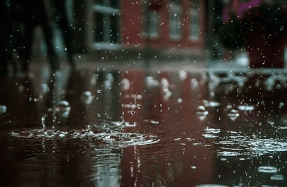The Invisible War
 Illustration by Anne Le Guern
Illustration by Anne Le Guern برای نسخه ی فارسی مقاله به این لینک مراجعه کنید
An icy wind slaps my face as I step onto Rahahan (Railway) Square, one of Tehran’s busiest transit hubs. I walk by a grass field next to a rectangular pool; the train station, a wide marble building with lengthwise windows like multiple eyes, stares at me from the other end. As a child during another war — between 1980 and 1988, between Iran and Iraq — my family’s journey home, after summertime visits to relatives in Tehran, began from this place; I’d carry our bag of chicken slaw sandwiches as we ran to catch the train back to our hometown in southern Iran, where battle raged at the border. Today I pass a young trash picker, maybe thirteen, pulling himself out of a garbage bin. A mother is squatting with a child in her lap, her face covered by her navy scarf and her hand held up for alms.
It is January of 2021, and Iran’s third COVID-19 wave has just plateaued. For months now, I’ve been trying to write a story about what it has been like for a country to experience US sanctions and a pandemic at the same time. There has been an invisible war on my country throughout my lifetime. And then there came a disease. Even as we fought live during a pandemic, we were already ravaged by an unseen conflict. Two chaoses merged.
Today, I am looking for people who were first in the line of fire. I’ve come to the train station to meet Ms. Alizadeh*, a forty-four-year-old technician at the neonatal intensive care unit of a nearby hospital.
We see each other and say hello behind our masks. She has milky-white skin and eyes the shape of eucalyptus leaves, oval and elongated. She wears a green flower-print scarf pinned at the chin under her black chador. I’ve met her at the hospital before and know she moved to Tehran a decade ago, from a village five hours away.
When her only child was two years old, her husband was diagnosed with a chronic illness that left him unable to work, and Alizadeh became her family’s sole breadwinner. “On some days, I had nothing to feed us but dry bread and water,” she remembers. Alizadeh had to quickly devise a plan out of hunger. She looked for work at the hospital, starting out on the cleaning staff. It was immense physical labor, but it also meant that Alizadeh could afford to feed the three of them. “My money then had barkat (blessings); I could stretch it to pay for our needs,” she says.
This is no longer the case. Less than a year after the US government restored sanctions against Iran, in 2018, food prices soared. Alizadeh had to cut down beef consumption to a single kilogram a month. She chopped it into pieces the size of peas, which she put into stews. Alizadeh ate the broth and gave the meat to her husband and child, who “needed the nutrients,” she says.
They were experiencing what the economic analyst Yar Batmanghelij calls “the weaponization of inflation” — an inflation forced upon people in countries under economic blockades. Sanctions have been suffocating Iran’s sources of revenue, devaluing our currency and strangulating our economy. The most immediate impact on the street is soaring prices.
Around the same time, Alizadeh started feeling “immense joint and muscle pain, as if my body was hollow and I would collapse to the ground.” Walking and even breathing became difficult. After multiple
You’re reading a preview, subscribe to read more.
Start your free 30 days





